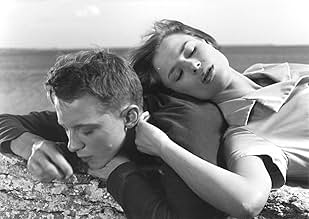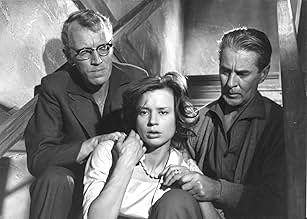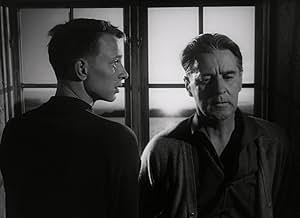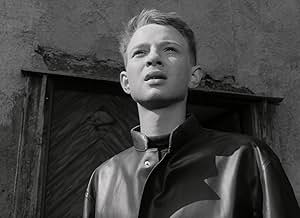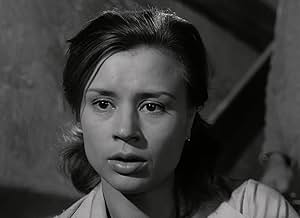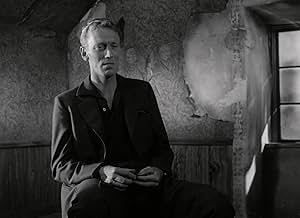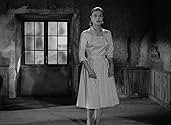CALIFICACIÓN DE IMDb
7.9/10
29 k
TU CALIFICACIÓN
Karin se reúne con su disfuncional familia en la isla que es su hogar tras recibir el alta de una institución psiquiátrica. La realidad se le escapa entre los dedos cuando empieza a creer qu... Leer todoKarin se reúne con su disfuncional familia en la isla que es su hogar tras recibir el alta de una institución psiquiátrica. La realidad se le escapa entre los dedos cuando empieza a creer que Dios la visita.Karin se reúne con su disfuncional familia en la isla que es su hogar tras recibir el alta de una institución psiquiátrica. La realidad se le escapa entre los dedos cuando empieza a creer que Dios la visita.
- Dirección
- Guionista
- Elenco
- Ganó 1 premio Óscar
- 3 premios ganados y 5 nominaciones en total
- Dirección
- Guionista
- Todo el elenco y el equipo
- Producción, taquilla y más en IMDbPro
Opiniones destacadas
10jhclues
A character study set on a secluded island off the coast of Sweden, `Through A Glass, Darkly' is Ingmar Bergman's pensive chronicle of a young woman's descent into the maelstrom of schizophrenia. The story centers on Karin (Harriet Andersson), who has reached a pivotal juncture in her life; having just been released from a mental hospital, she must now face the uncertainties inherent in the nature of her illness. It is a crucial period in her life; she occupies a middle ground between two worlds, and the question now is, will she ultimately emerge in the light, or succumb to the darkness of the voices that beckon her from within. Through Bergman's eyes we observe the effects of her situation on the three people closest to her, her husband, Martin (Max von Sydow), her father, David (Gunnar Bjornstrand) and her brother, Minus (Lars Passgard). The movie explores their relationships to Karin (and to one another), and how differently each one them strives to cope with and understand her elusive affliction. An absorbing, evocative and sometimes tense drama, the film is impeccably delivered by Bergman, and the performances are all exemplary, especially Harriet Andersson, who brings the tortured soul of Karin to life with nuance and a depth and grasp of the character that is remarkable. Von Sydow is also perfect as the troubled Martin, and aptly conveys the quandary of his situation, which he approaches with a reserved, committed gentleness. Bjornstrand maintains a stoic presence throughout as the novelist/father attempting to resolve an inner conflict borne of guilt and doubtful motives, and Passgard gives a notable performance, as well; his angst and confusion are deeply felt and well played. The first of Bergman's 'Faith' trilogy (followed by `Winter Light' and `The Silence'), `Through A Glass, Darkly' is one of his finest works, an intricate exploration of the fragility of the human psyche and the complexities of life. An Oscar winner for Best Foreign Film of 1961, it firmly establishes Bergman as one of Cinema's greatest directors. It is an emotional and engrossing film that should not be missed. I rate this one 10/10.
Well, we don't see darkly through a glass, and Bergman explains in his "Introductions" that during the ancient times, there were no glass, the mirrors were made of metal, bronze, for instance and while looking through the metal mirror, the face and the background appear darker than in reality. Does it mean that when we look inside ourselves like in the mirror, we appear darker and more sinister than we are? Or the other way around?
"Through a Glass Darkly" is a typically great Bergman's film - four people arrive to an isolated island to spend a few days together, a young woman, her husband, father, and brother. They seem to love one another and are perfectly happy and comfortable in the beginning. It does not last long - not in the Bergman's world. Harriet Anderson was amazing as Karin, a mentally sick young woman, who was just released from the hospital but I believe three other actors playing Father (Gunnar Bjornstrand), Husband (Max von Sydow), and Brother (Lars Passgård) were as good as she was. The Father was especially interesting - he was a reason Karin became ill on the first place and his diary sent her to the total mental breakdown. As with "Persona" and "Autumn Sonata", Bergman is asking again how far is an Artist willing to go for his Art? Here, Father, the writer wants to be a cool and remote observer of his daughter's mental tragedy as a study for his future work. There is a hope, though, in the end. Not for Karin - it is too late for her - but for her confused young brother who is also fighting for his sanity and desperately needs his father's love and understanding. His last words - "Daddy talked to me" - give this bleak and tragic story the hope that his life could be different. Or maybe not...
"Through a Glass Darkly" is a typically great Bergman's film - four people arrive to an isolated island to spend a few days together, a young woman, her husband, father, and brother. They seem to love one another and are perfectly happy and comfortable in the beginning. It does not last long - not in the Bergman's world. Harriet Anderson was amazing as Karin, a mentally sick young woman, who was just released from the hospital but I believe three other actors playing Father (Gunnar Bjornstrand), Husband (Max von Sydow), and Brother (Lars Passgård) were as good as she was. The Father was especially interesting - he was a reason Karin became ill on the first place and his diary sent her to the total mental breakdown. As with "Persona" and "Autumn Sonata", Bergman is asking again how far is an Artist willing to go for his Art? Here, Father, the writer wants to be a cool and remote observer of his daughter's mental tragedy as a study for his future work. There is a hope, though, in the end. Not for Karin - it is too late for her - but for her confused young brother who is also fighting for his sanity and desperately needs his father's love and understanding. His last words - "Daddy talked to me" - give this bleak and tragic story the hope that his life could be different. Or maybe not...
Between 1957-1963, Ingmar Bergman directed seven films. In my mind, there has never been such an amazingly creative period for a director as the six years between Wild Strawberries and The Silence. Through a Glass Darkly stands out to me as not only the masterpiece of this era, but of Bergman's entire career. This film has such a distinct atmosphere, which conveys not only isolation and melancholy, but also dark, austere beauty. Every little piece of this film fits together like a glorious completed puzzle. The Bach playing over the opening credits. The cinematography, with long, meditative shots in glowing black and white. The performances turned in by Harriet Andersson, Gunner Bjornstrand, and Bergman regular Max von Sydow. Overall, I sense that Bergman's vision is so obviously being displayed on the screen, as if his soul is being laid bare. As a singular piece of art, it is just staggering to behold. I think that everyone has albums or films that they connect with certain periods in their life, that transcend the mundane and just touch you in a profound way. Through a Glass Darkly is one for me. A must see.
Through a Glass Darkly marks one of the first collaborations between Bergman and his long time cinematographer Sven Nykvist (who passed away this last September). Nykvist shot films as varied as Lasse Hallestroms 'What's Eating Gilbert Grape' to Woody Allen's 'Crimes and Misdemeanors.' Nykvist's touch is present throughout the film, a style that begins to become a part of Bergman's signature mise-en-scene.
Bergman's screenplay is transitional because of it's scarcity of saturation. Using a cast of only four and only one location, the family's country home on an island off the coast of Sweden. Karin (Harriet Andersson) is slowly going mad, her family (fiancée, father and brother) are trying to understand her and not send her away, trying to let her know that things may be alright as she descends into hysteria, talking to walls, waiting for god to come out of the closet.
The film is quite simply a masterpiece. A portrayal of descent into madness and the effect on others that feels more grounded in reality than even the best of films on madness (see: Shock Corridor Samuel Fuller, One Flew Over the Cuckoo's Nest Milos Foreman, or The Three Burials of Melquiades Estrada Tommy Lee Jones) Nykvist's mostly static camera gives the film a brooding sense of anticipation, lingering motionlessly, allowing the actors to move freely into deep frames, marginalizing themselves as they move about the large empty frame. The camera even goes so far as to linger a little too long at times, waiting long after the actors have exited the frame, making sure that the audience is aware that the hollowness, these spaces they live and think in exist without them, these voids the audience is watching never go away.
These sentiments are echoed by the well penned script. The father's regret over the madness of his deceased wife, the husbands jealousy, his inability to act, the nearly sexual love the brother feels for Karin, his isolation and inability to get over his immaturity. It's a delicately woven, exquisitely beautiful film on the landscapes of the mind and the solitude of life and the search for god. A good introduction to the psychological drama of Bergman for anyone unfamiliar with one cinema's masters.
Bergman's screenplay is transitional because of it's scarcity of saturation. Using a cast of only four and only one location, the family's country home on an island off the coast of Sweden. Karin (Harriet Andersson) is slowly going mad, her family (fiancée, father and brother) are trying to understand her and not send her away, trying to let her know that things may be alright as she descends into hysteria, talking to walls, waiting for god to come out of the closet.
The film is quite simply a masterpiece. A portrayal of descent into madness and the effect on others that feels more grounded in reality than even the best of films on madness (see: Shock Corridor Samuel Fuller, One Flew Over the Cuckoo's Nest Milos Foreman, or The Three Burials of Melquiades Estrada Tommy Lee Jones) Nykvist's mostly static camera gives the film a brooding sense of anticipation, lingering motionlessly, allowing the actors to move freely into deep frames, marginalizing themselves as they move about the large empty frame. The camera even goes so far as to linger a little too long at times, waiting long after the actors have exited the frame, making sure that the audience is aware that the hollowness, these spaces they live and think in exist without them, these voids the audience is watching never go away.
These sentiments are echoed by the well penned script. The father's regret over the madness of his deceased wife, the husbands jealousy, his inability to act, the nearly sexual love the brother feels for Karin, his isolation and inability to get over his immaturity. It's a delicately woven, exquisitely beautiful film on the landscapes of the mind and the solitude of life and the search for god. A good introduction to the psychological drama of Bergman for anyone unfamiliar with one cinema's masters.
Her eyes could not deceive what her mind made her believe, though to others she's disturbed and increasingly perturbed, as a cocktail of delusion, creates confusion and illusion, and there's nothing they can do, except observe as she looks through.
There are outstanding performances and there are Harriet Andersson performances and there is a difference between the two, especially under the guidance of this director, as she takes you on the nightmare that Karin lives, the struggles she endures (and of those that surround her), as her world cascades through torment and torture that she can do very little about, and at the time nobody else could be of much help either.
There are outstanding performances and there are Harriet Andersson performances and there is a difference between the two, especially under the guidance of this director, as she takes you on the nightmare that Karin lives, the struggles she endures (and of those that surround her), as her world cascades through torment and torture that she can do very little about, and at the time nobody else could be of much help either.
¿Sabías que…?
- TriviaThe first Ingmar Bergman film to be made on the island of Fårö. Bergman would later buy a home on the island.
- ErroresAs Minus paints the chair, the amount of paint on the chair changes between shots.
- Créditos curiososThere are no end credits. After Minus (Lars Passgård) says the final line, the film fades to black and ends. The entire cast and crew were credited at the start, and there isn't even a "Fin" or "Ende".
- ConexionesFeatured in Reel Radicals: The Sixties Revolution in Film (2002)
- Bandas sonorasSarabande from Suite No. 2 in D minor for Violoncello
Written by Johann Sebastian Bach
Performed by Blondal Bengston.
Selecciones populares
Inicia sesión para calificar y agrega a la lista de videos para obtener recomendaciones personalizadas
- How long is Through a Glass Darkly?Con tecnología de Alexa
Detalles
Taquilla
- Total a nivel mundial
- USD 8,939
- Tiempo de ejecución
- 1h 30min(90 min)
- Color
- Mezcla de sonido
- Relación de aspecto
- 1.37 : 1
Contribuir a esta página
Sugiere una edición o agrega el contenido que falta


